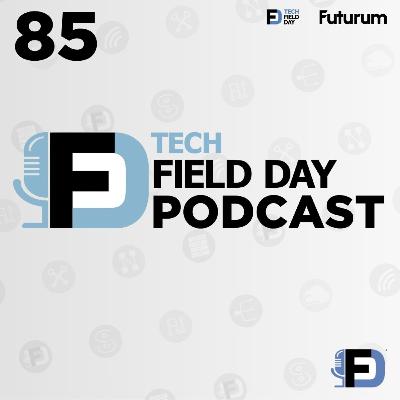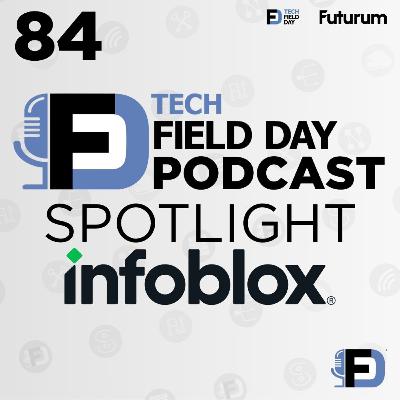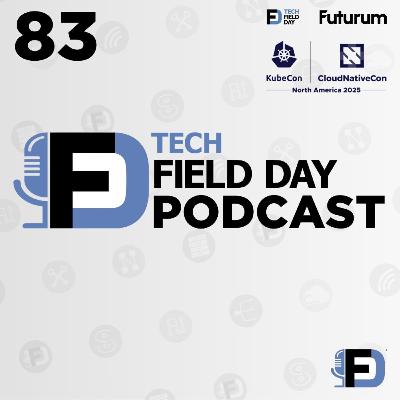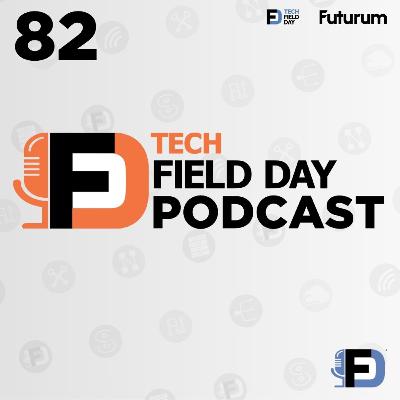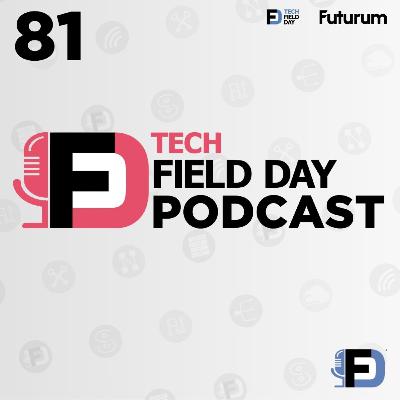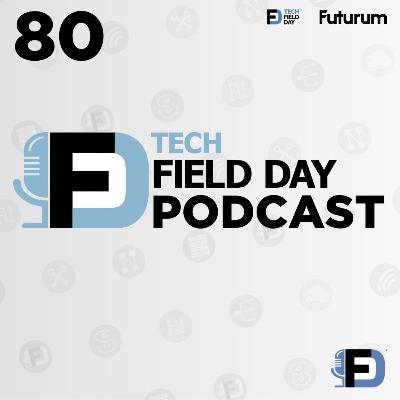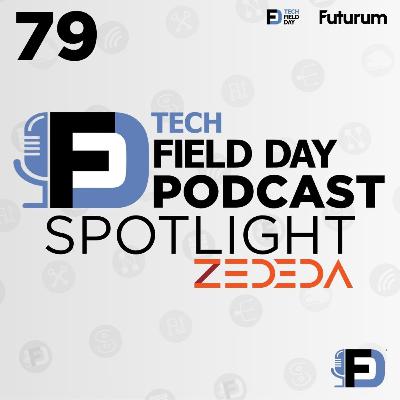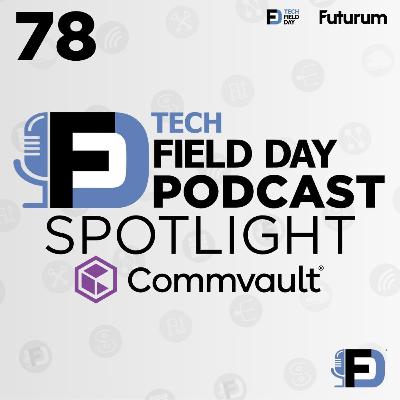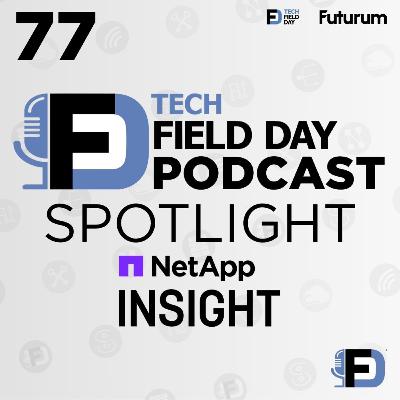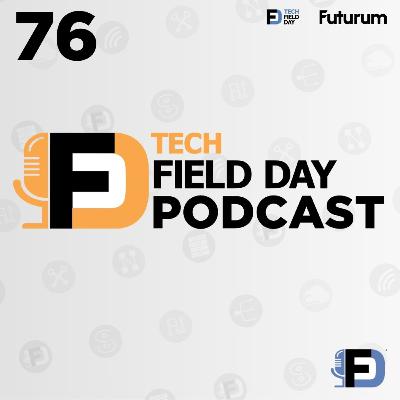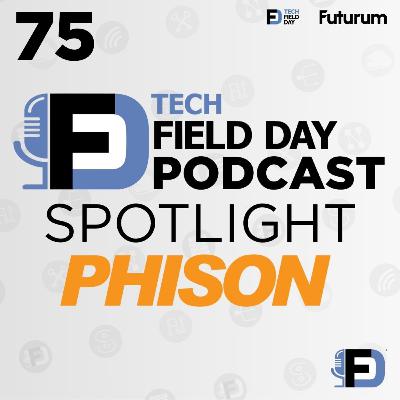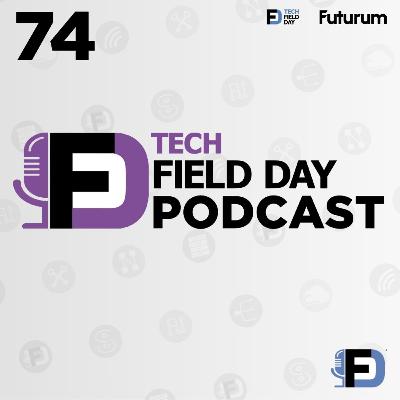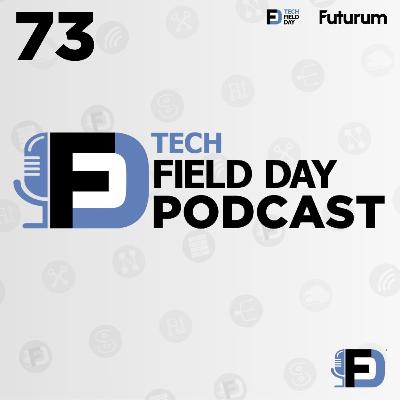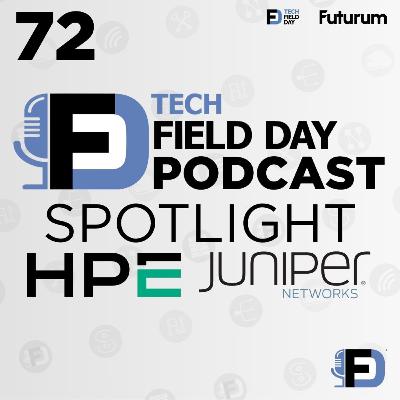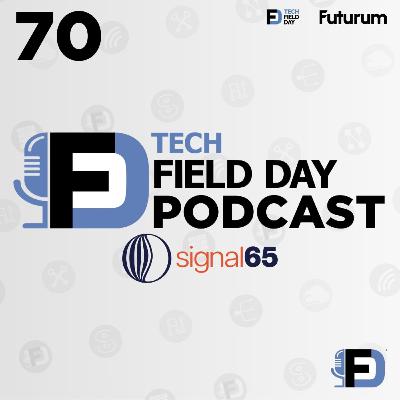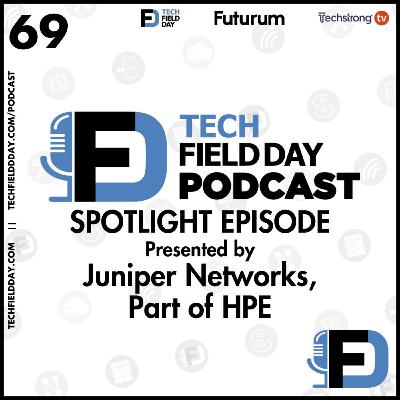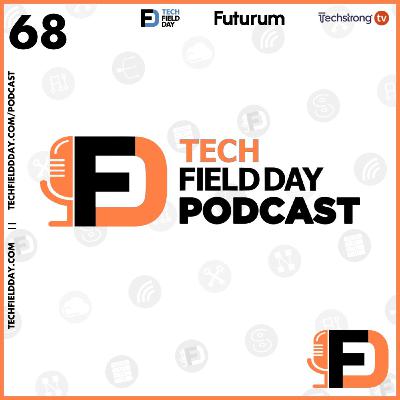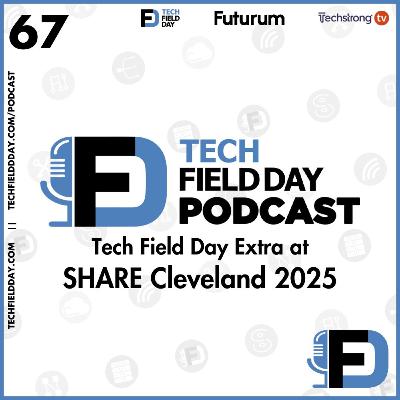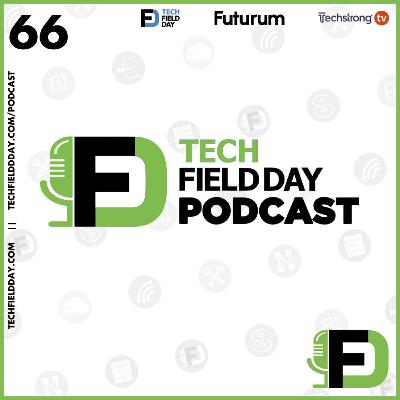Discover Tech Field Day Podcast
Tech Field Day Podcast

Tech Field Day Podcast
Author: Tech Field Day
Subscribed: 197Played: 3,476Subscribe
Share
© Tech Field Day
Description
The Tech Field Day Podcast is the only podcast that dares to be both on topic, or on premise, and sometimes on location, bringing together a group of independent IT luminaries and experts in their field from around the Enterprise to discuss a single idea revolving around their technological knowledge base and skillset. This podcast is hosted by Stephen Foskett, Organizer of the Tech Field Day event series, and Tom Hollingsworth, Tech Field Day Event Lead.
335 Episodes
Reverse
Watch the presentations from Cloud Field Day 24 here.Simplification in IT is an illusion; increasing complexity outpaces every effort to simplify. This episode of the Tech Field Day podcast, recorded on-site at Cloud Field Day 24, features Camberley Bates, Nathan Nielsen, Guy Currier, and Alastair Cooke. Cloud services and centralized management platforms offer simplified interfaces but also introduce a multitude of choices and underlying complexities. History matters; advancements from mainframes to PCs demonstrate continuously shifting goalposts, while the more recent integration of cloud and AI contributes to increased complexity. It may be that AI brings simply advanced simplicity, yet it may also bring the unintended consequence of people becoming "ignorant" of how IT works. CIOs and CTOs need to think strategically to manage increasingly complex environments, striking a balance between patchwork fixes and long-term strategic approaches.Host: Alastair Cooke, Event Lead at Tech Field DayPanelists:Guy Currier, Chief Analyst at Visible Impact, The Futurum GroupCamberley BatesNathan NielsenFollow the Tech Field Day Podcast on X/Twitter or on Bluesky and use the Hashtag #TFDPodcast to join the discussion. Listen to more episodes on the podcast page of the website.Follow Tech Field Day for more information on upcoming and current event coverage on X/Twitter, on Bluesky, and on LinkedIn, or visit our website.
Watch Infoblox and more Security Field Day 14 videos here.DNS security is no longer optional. This service is not only being attacked by nefarious actors but it is also being leveraged in ways to compromise users and exfiltrate data. In this episode of the Tech Field Day podcast, brought to you by Infoblox, Tom Hollingsworth is joined by Jack Poller and Cricket Liu. They talk about the historical openness of DNS and how that has led to it becoming easy to see what users are doing and create ways to manipulate them. They discuss ways to secure the protocol and how companies like Infoblox are extending the capabilities for future security.Infoblox RepresentativeCricket Liu, EVP Engineering, Chief DNS Architect. and Senior FellowHost: Tom Hollingsworth, Event Lead for Tech Field Day.Panelist:Jack Poller, Principal Analyst at Paradigm TechnicaFollow the Tech Field Day Podcast on X/Twitter or on Bluesky and use the Hashtag #TFDPodcast to join the discussion. Listen to more episodes on the podcast page of the website.Follow Tech Field Day for more information on upcoming and current event coverage on X/Twitter, on Bluesky, and on LinkedIn, or visit our website.
Learn more about Tech Field Day Experience at KubeCon here.In a world of well-managed Kubernetes, we hoped that infrastructure finally wouldn’t matter. This episode of the Tech Field Day podcast features John Willis and Guy Currier wishing that infrastructure didn’t matter, with Alastair Cooke. Every new infrastructure revolution claims to make infrastructure invisible, from virtualization through HCI and cloud to containers and Kubernetes. The reality has always been that these revolutions shift the definition of infrastructure and bring some new aspect to be managed. Developers building features and applications want to focus on satisfying some business need, not considering storage devices and network configurations. Virtualization and Kubernetes both made delivering infrastructure easier, but neither eliminated infrastructure architecture and management. The dream of self-deploying and self-organizing infrastructure is as distant as it ever was. Agentic AI is the latest new hope to eliminate infrastructure challenges, yet it brings its own complex infrastructure requirements. Will we ever stop caring about IT infrastructure?Host: Alastair Cooke, Event Lead for Tech Field DayGuests:Guy Currier, Research Director for The Futurum GroupJohn Willis, Owner of Botchagalupe TechnologiesFollow the Tech Field Day Podcast on X/Twitter or on Bluesky and use the Hashtag #TFDPodcast to join the discussion. Listen to more episodes on the podcast page of the website.Follow Tech Field Day for more information on upcoming and current event coverage on X/Twitter, on Bluesky, and on LinkedIn, or visit our website.
Learn more about Networking Field Day 39 here.The industry has embraced AI for every possible problem. Operations will eventually embrace it as well but questions remain about how it will be implemented. In this episode, Tom Hollingsworth sits down with Pete Welcher, Rita Younger, and Jonathan Davis to discuss the issues that remain with implementing AI into an operations workflow. They discuss licensing and procurement, the need for institutional knowledge, and how this will all work in a multivendor world. They wrap up with some guidance about how to approach your next big AIOps project.Host: Tom Hollingsworth, Event Lead for Tech Field Day.Panelists:Rita Younger, Practice Lead for Data Center Networking, WWTPete Welcher, Networking ExpertJonathan Davis, Senior Wireless and Network Engineer, East DataCommFollow the Tech Field Day Podcast on X/Twitter or on Bluesky and use the Hashtag #TFDPodcast to join the discussion. Listen to more episodes on the podcast page of the website.Follow Tech Field Day for more information on upcoming and current event coverage on X/Twitter, on Bluesky, and on LinkedIn, or visit our website.
Learn more about AI Field Day 7 on our website.Despite widespread skepticism, AI is already widely used in the enterprise, often in the form of so-called shadow applications outside traditional IT. This episode of the Tech Field Day Podcast, recorded on the eve of AI Field Day, features delegates Ryan Booth and Dave Graham discussing the real state of AI adoption in the enterprise with host Stephen Foskett. Just like the advent of the PC, generative AI is widely used across businesses, typically on a bring-your-own basis rather than as a coordinated effort by the IT department. The same process happened in the Software-as-a-Service world, where each department and even individual adopted multiple tools that met their needs. There will soon be a reckoning, where businesses try to get their hands around all of the AI applications being used across the enterprise. The next step is to develop a plan to control sprawl of tools, models, data, and subscriptions to ensure that this shadow AI doesn't become a risk to the company. Then companies need to be prepared as AI agents become critical to their operations, likely also deployed by individuals without corporate control.Host: Stephen Foskett, President and Organizer of Tech Field Day. Panelists: Dave Graham, Head of Marketing at MLCommonsRyan BoothFollow the Tech Field Day Podcast on X/Twitter or on Bluesky and use the Hashtag #TFDPodcast to join the discussion. Listen to more episodes on the podcast page of the website.Follow Tech Field Day for more information on upcoming and current event coverage on X/Twitter, on Bluesky, and on LinkedIn, or visit our website.
Learn more about Cloud Field Day 24 here. Private cloud is not just virtualization 4.0, self-service VM deployment doesn’t fulfil the same need as the Public Cloud. This episode of the Tech Field Day podcast features Mike Graff, Jon Hildebrand, and Alastair Cooke. Private cloud has evolved from simple virtualization to a more comprehensive, cloud-like experience, emphasizing the need for on-premises infrastructure to offer the same developer-friendly tools and APIs as public clouds. Some application repatriation is driven by cost concerns and enabled by rise of technologies like Kubernetes and OpenShift for managing containerized workloads. A unified control plane for hybrid cloud environments is vital, as is accurate cost accounting for on-premises resources. Enterprises will search for a hybrid approach where developers can deploy applications without needing to worry about the underlying infrastructure.Host: Alastair Cooke, Event Lead for Tech Field DayPanelists: Mike Graff, Infrastructure Architecture Director at DolbyJon Hildebrand, Independent Contractor, CloudFollow the Tech Field Day Podcast on X/Twitter or on Bluesky and use the Hashtag #TFDPodcast to join the discussion. Listen to more episodes on the podcast page of the website.Follow Tech Field Day for more information on upcoming and current event coverage on X/Twitter, on Bluesky, and on LinkedIn, or visit our website.
Projects to deliver applications to edge locations will fail without comprehensive fleet lifecycle management. This episode of the Tech Field Day podcast features Sachin Vasudeva from Zededa discussing the importance of long-term edge management with Guy Currier and Alastair Cooke. There are unique challenges of managing edge deployments compared to cloud or on-premises environments. Focusing on business logic and application outputs while leveraging infrastructure providers to handle the complexities of packaging, deploying, and monitoring AI models enables diverse edge environments. Edge locations might have different hardware deployed, intermittent connectivity, requiring a balance between standardization and flexibility in managing edge devices and applications. Teams with rapid responsiveness and adaptation will better enable their business to respond to changing conditions, especially with the rapid pace of AI innovation.Guest: Sachin Vasudeva, VP of Product at ZEDEDAHosts: Alastair Cooke, Tech Field Day Event LeadGuy Currier, Research Director at The Futurum GroupFollow the Tech Field Day Podcast on X/Twitter or on Bluesky and use the Hashtag #TFDPodcast to join the discussion. Listen to more episodes on the podcast page of the website.Follow Tech Field Day for more information on upcoming and current event coverage on X/Twitter, on Bluesky, and on LinkedIn, or visit our website.
More Information on Commvault ShiftEvery company lives in fear of a ransomware attack, whether they have suffered one or not, and this is even more critical in the era of AI. This episode of the Tech Field Day Podcast looks forward to Commvault SHIFT in November with a discussion of the importance of data protection to AI applications with Tim Zonca from Commvault, frequent delegate Gina Rosenthal, and host Stephen Foskett. AI applications are reliant on good data, and yet this same technology makes it easier for attackers to breach corporate controls. Today’s social engineering and phishing is more convincing than ever thanks to generative AI, and this has helped ransomware crews to adopt larger and more powerful attacks. Ransomware is a massive business, and it isn’t going away any time soon. At the same time, GenAI applications offer a new attack surface, as agentic AI is empowered to take action based on untrusted inputs. Not only can we not stop ransomware, but the pace and technical capabilities of these attacks keeps accelerating. There is reason for optimism, however, as data protection tools keep getting better. Today’s AI-optimized tools can effectively categorize data, burst or migrate to different locations, and roll back or recover from corruption or compromise. In the future, we will see increasing use of AI to monitor systems and data, detecting patterns and hardening the attack surface.Guest: Tim Zonca, VP of Portfolio Marketing at CommvaultHost:Stephen Foskett, President and Organizer of Tech Field DayGina Rosenthal, Principal Product Marketing Manager, Digital Sunshine SolutionsFollow the Tech Field Day Podcast on X/Twitter or on Bluesky and use the Hashtag #TFDPodcast to join the discussion. Listen to more episodes on the podcast page of the website.Follow Tech Field Day for more information on upcoming and current event coverage on X/Twitter, on Bluesky, and on LinkedIn, or visit our website.
More information on NetApp InsightRunning enterprise applications in production is a lot different from the AI experiments many of us have been involved with so far. This episode of the Tech Field Day podcast, recorded prior to NetApp Insight 2025, features Ingo Fuchs from NetApp along with Gina Rosenthal, Glenn Dekhayser, and Stephen Foskett. AI applications often start as experiments with a limited data set, but once these are moved to production there are many critical decisions to be made. Data must be classified and cleaned, removing personal and financial data and proprietary information before it even reaches an LLM. Data also must be structured for embedding and vectorization prior to use by an LLM. And we have to ensure that data is up to date or the application will not serve the customer properly. Finally we have to consider whether it is proper and ethical to share and act on this data. Many of the challenges facing modern AI applications are similar to the historic issues faced by enterprise storage, and this is an area in which NetApp and their customers have decades of experience.NetApp Representative: Ingo Fuchs, Chief Technologist of AI at NetAppHost:Stephen Foskett, President and Organizer of Tech Field DayGina Rosenthal, Principal Product Marketing Manager, Digital Sunshine SolutionsGlenn Dekhayser, Global Principal Technologist at Equinix Follow the Tech Field Day Podcast on X/Twitter or on Bluesky and use the Hashtag #TFDPodcast to join the discussion. Listen to more episodes on the podcast page of the website.Follow Tech Field Day for more information on upcoming and current event coverage on X/Twitter, on Bluesky, and on LinkedIn, or visit our website.
Learn more about Security Field Day here.Passwords create friction and therefore users find ways around them. New technology such as secure enclaves and PKI allow us to create better solutions like passkeys. In this episode of the Tech Field Day Podcast. Alan Shimel and Kate Scarcella join Tom Hollingsworth to discuss the problems with traditional passwords and how passkeys overcome them. They also talk about why it has taken so long to adopt passkeys and what barriers remain to full implementation. The wrap up with a look at what might lay ahead on the horizon for the future of user security.HostTom Hollingsworth, Event Lead at Tech Field DayPanelistsAlan Shimel, CEO of Techstrong GroupKate Scarcella, Cybersecurity Architect and Security ExpertFollow the Tech Field Day Podcast on X/Twitter or on Bluesky and use the Hashtag #TFDPodcast to join the discussion. Listen to more episodes on the podcast page of the website.Follow Tech Field Day for more information on upcoming and current event coverage on X/Twitter, on Bluesky, and on LinkedIn, or visit our website.
AI will need less HBM (high bandwidth memory) because flash memory unification is changing training and inference. This episode of the Tech Field Day podcast features Sebastien Jean from Phison, Max Mortillaro, Brian Martin, and Alastair Cooke. Training, fine-tuning, and inference with Large Language Models traditionally use GPUs with high bandwidth memory to hold entire data models and data sets. Phison’s aiDaptiv+ framework offers the ability to trade lower cost of infrastructure against training speed or allow larger data sets (context) for inference. This approach enables users to balance cost, compute, and memory needs, making larger models accessible without requiring top-of-the-line GPUs, and giving smaller companies more access to generative AI.Learn more about Phison's solutions here.Phsion Representative: Sebastien Jean, CTO of Phison ElectronicsHostAlastair Cooke, Tech Field Day Event LeadPanelistsBrian Martin, VP of AI and Datacenter Performance at Signal65Max Mortillaro, Chief Research Officer at Osmium GroupFollow the Tech Field Day Podcast on X/Twitter or on Bluesky and use the Hashtag #TFDPodcast to join the discussion. Listen to more episodes on the podcast page of the website.Follow Tech Field Day for more information on upcoming and current event coverage on X/Twitter, on Bluesky, and on LinkedIn, or visit our website.
Learn more about AI Infrastructure Field Day 3 here.Hardware always matters, especially in AI and now software is automating your AI data centre infrastructure. This episode of the Tech Field Day podcast features Gina Rosenthal, Barton George, Andy Banta, and Alastair Cooke. Generative AI brought new hardware into enterprise data centres; GPUs, TPUs, NPUs, XPUs all offload AI processing from CPUs for more performance and efficiency. Feeding these accelerators requires fast networks and fast storage, common topics for AI Infrastructure Field Day events. In parallel, sophisticated software to automate the deployment and operation of this new hardware is vital to return value fast and optimize the value from the hardware investment. Automation platforms are moving up towards delivering multiple AI applications on shared XPU infrastructure, where AI inference delivers the business value.HostAlastair Cooke, Tech Field Day Event LeadPanelistsGina Rosenthal, Digital Sunshine SolutionsAndy Banta, MagnitionlOBarton George, Al Infrastructure and Cloud SpecialistFollow the Tech Field Day Podcast on X/Twitter or on Bluesky and use the Hashtag #TFDPodcast to join the discussion. Listen to more episodes on the podcast page of the website.Follow Tech Field Day for more information on upcoming and current event coverage on X/Twitter, on Bluesky, and on LinkedIn, or visit our website.
You aren’t in the business of twiddling the dials, even though the dials may still be important. This episode of the Tech Field Day podcast features Guy Currier, Jay Cuthrell, and Alastair Cooke. Knowledge of all the dials and controls has historically been a defining characteristic of infrastructure experts. The introduction of infrastructure as a service, then as code, and policy as code have shifted focus to more abstracted controls. Do these abstractions reduce the value of knowing every feature and setting, or eliminate the value of technology specialists? Generative AI and business-as-code may spell the end of the dial twiddlers. Optimizing every setting at every level in an infrastructure and application is probably not valuable to business, but there are still places where maximum business value comes from detailed knowledge of those dials.HostAlastair Cooke, Tech Field Day Event LeadPanelists:Guy Currier, Chief Analyst, Visible Impact, Part of the Futurum GroupJay Cuthrell, Chief Product Officer, NexusTekFollow the Tech Field Day Podcast on X/Twitter or on Bluesky and use the Hashtag #TFDPodcast to join the discussion. Listen to more episodes on the podcast page of the website.Follow Tech Field Day for more information on upcoming and current event coverage on X/Twitter, on Bluesky, and on LinkedIn, or visit our website.
Agentic AI is reshaping the IT landscape and networking is no exception. Building upon the previous research into machine learning means we have a head start on harnessing that power. In this episode of the Tech Field Day podcast, brought to you by HPE Juniper Networking, Tom Hollingsworth is joined by Keith Parsons and Sunalini Sankhavaram. They talk about how agentic AI is driving new methods for operating networks and helping humans concentrate on real problems instead of menial tasks. They also discuss how agentic AI can power self-driving networks where configuration and provisioning are done automatically or with a minimum of effort to ensure resiliency and enhance user expectations.HPE Juniper Networking Panelist: Sunalini Sankhavaram, VP Product Management, AIOps for Enterprise Networking HPE Juniper NetworkingPanelists: Keith Parsons, Managing Director, Wireless LAN, Professionals ConferenceFollow the Tech Field Day Podcast on X/Twitter or on Bluesky and use the Hashtag #TFDPodcast to join the discussion. Listen to more episodes on the podcast page of the website.Follow Tech Field Day for more information on upcoming and current event coverage on X/Twitter, on Bluesky, and on LinkedIn, or visit our website.
Converged networking is creating complexity with network operations and engineering teams. Ensuring that users are able to access resources and complete workflows means being up-to-date with the latest technology behind the scenes. You need a trusted partner to make it all happen with minimal issues.In this episode of the Tech Field Day Podcast, brought to you by HPE Aruba Networking, Tom Hollingsworth is joined by Chris Grundemann, Jeff Olson, and Adam Fuoss as they discuss the growing challenges with networking and how HPE Aruba Networking is addressing them. They talk about SASE and SSE and how tools such as Cloud-Native NAC and SASE AI Copilot work together to address the needs of the modern network. These features, debuted at Black Hat 2025, help teams by making sense of the network and keeping it secure from intruders.They discuss how AI is going to accelerate operations teams while providing context and understanding for challenges. They also talk about how cloud native principles an apply to both online and on-prem configurations. The panel wraps up with a discussion of the importance of a sole-source provider for these solutions and how HPE Aruba Networking is addressing the integration of recent acquisitions.Learn more here.HPE SASE Landing PageHPE Black Hat 2025 Press ReleaseHPE Juniper Networks Panelists:Jeff Olson, Director, SD-WAN Product and Technical MarketingAdam Fuoss, Vice President, Product Management, SD-WANPanelists:Chris Grundemann, Network Infrastructure AdvisorFollow the Tech Field Day Podcast on X/Twitter or on Bluesky and use the Hashtag #TFDPodcast to join the discussion. Listen to more episodes on the podcast page of the website.Follow Tech Field Day for more information on upcoming and current event coverage on X/Twitter, on Bluesky, and on LinkedIn, or visit our website.
If you haven’t already, start working with Generative AI now and make sure to control your ongoing costs. This episode of the Tech Field Day podcast features Russ Fellows, Mitch Lewis, and Brian Martin, all from Signal65, and is hosted by Alastair Cooke. Generative AI is delivering value to businesses of all sizes, but significant evolution in models and technologies remains before maturity is achieved. Experimentation is essential to understand the value of new technologies, starting with cloud resources or small-scale on-premises servers. Business value is derived from the inference stage, where AI tools generate actionable information for users. Generative AI is like a knowledgeable and well-intentioned intern; someone more senior must ensure AI is given good instructions and check their work. In production, grounding and guard rails are vital to keep your AI an asset, not a liability.HostAlastair Cooke, Tech Field Day Event LeadSignal65 Representatives: Russ Fellows, VP of Signal65Brian Martin, AI and Datacenter Lead at Signal65Mitch Lewis, Research Analyst at Signal65Follow the Tech Field Day Podcast on X/Twitter or on Bluesky and use the Hashtag #TFDPodcast to join the discussion. Listen to more episodes on the podcast page of the website.Follow Tech Field Day for more information on upcoming and current event coverage on X/Twitter, on Bluesky, and on LinkedIn, or visit our website.
Enterprise networking is too large and complex, we need AI Operations. This spotlight episode of the Tech Field Day podcast features Bob Friday and Ben Baker, both from Juniper Networks, with Jack Poller and Alastair Cooke. Modern enterprise networks reach far beyond the well-controlled walls of data centres and corporate buildings. The rate of change enabled by public cloud platforms makes an enterprise network highly dynamic. Access to cloud and on-premises applications over the Internet means your users are dependent on many network elements outside of your control. Bob founded Mist Networks to help businesses manage the complexity of user-to-cloud networking. Juniper Networks acquired Mist, and now HPE has acquired Juniper. I don’t think he is alone in seeing the necessity of using AI to manage complex and critical networks. Yet new tools always bring new challenges; the cost of AI infrastructure may be a concern, and Generative AI has challenges with hallucinations. The security and governance practices around AI tools are still developing, and the non-deterministic nature of AI needs careful consideration.HostAlastair Cooke, Tech Field Day Event LeadJuniper Representatives: Bob Friday, Chief AI Officer at HPE Juniper NetworksBen Baker, Data Center Marketing at HPE Juniper NetworksDelegatesJack Poller, Principal Analyst, Paradigm TechnicaFollow the Tech Field Day Podcast on X/Twitter or on Bluesky and use the Hashtag #TFDPodcast to join the discussion. Listen to more episodes on the podcast page of the website.Follow Tech Field Day for more information on upcoming and current event coverage on X/Twitter, on Bluesky, and on LinkedIn, or visit our website.
Network engineers are the firefighters and knowledge bases of enterprise IT, however the role of a network engineer is rapidly evolving. With the rise of automation, orchestration, and AI, the familiar image of an engineer hunched over a command-line interface (CLI) is giving way, leading many to question the future of their profession. In this episode, Tom Hollingsworth is joined by Ryan Harris, Chris Grundemann, and Nathan Nielsen as they discuss how the perception of their role has shifted, the continuous need for learning and adaptation, and whether the CLI is truly dead.The conversation explores the challenges and opportunities presented by these technological advancements, highlighting how network engineers are embracing new tools like chatbots and GUIs for enhanced visualization. While some aspects of the job, like manual CLI work, may be diminishing, the core principles of understanding network functionality remain core to the role of the network engineer. The panel talks about identity crisis in a field where continuous learning is essential, contrasting it with professions like doctors and lawyers who deal with slower-changing fundamentals. They discuss the value of specialization versus being a generalist, the concept of the “pitchfork engineer,” and ultimately, how redefining their identity as lifelong learners can help network engineers thrive in this ever-changing landscape.Learn more about Networking Field Day 38 here.Host: Tom Hollingsworth, Tech Field Day Event LeadPanelists: Ryan Harris, Senior Network EngineerChris Grundemann, Network Infrastructure ConsultantNathan Nielson, Principal Solutions ArchitectFollow the Tech Field Day Podcast on X/Twitter or on Bluesky and use the Hashtag #TFDPodcast to join the discussion. Listen to more episodes on the podcast page of the website.Follow Tech Field Day for more information on upcoming and current event coverage on X/Twitter, on Bluesky, and on LinkedIn, or visit our website.
As Tech Field Day heads to SHARE in Cleveland, we are considering the many ways the mainframe has been re-imagined and re-built for the AI era. This episode of the Tech Field Day podcast features Cynthia Overby of Rocket Software and SHARE, Derek Britton, and Jeffrey Powers discussing the modern mainframe with Stephen Foskett. Walk around the SHARE conference and you’ll see the same concepts and technologies that you would find at any other conference: AI, security, data management, software development, and connectivity. Although the mainframe platform is radically different from the so-called open systems used in the cloud and elsewhere, IBM has re-engineered the new z17 mainframe for the AI age. The mainframe hosts the most valuable data in the world, and if AI is going to be used it has to run locally. That’s why IBM added a second-generation AI accelerator to the latest Telum II processor, the Spyre Accelerator, and z/OS itself. We’re excited to be bringing Tech Field Day to SHARE to learn more about the modern mainframe and share the state of the art with our audience. Host: Stephen Foskett, Organizer and President of Tech Field DayPanel:Cynthia Overby, Director Strategic Security Solutions at Rocket SoftwareDerek Britton, Chief Marketing Officer, PopUp MainframeJeffrey Powers, Founder of Geekazine.comFollow the Tech Field Day Podcast on X/Twitter or on Bluesky and use the Hashtag #TFDPodcast to join the discussion. Listen to more episodes on the podcast page of the website.Follow Tech Field Day for more information on upcoming and current event coverage on X/Twitter, on Bluesky, and on LinkedIn, or visit our website.
The proposed remedies for the HPE acquisition of Juniper Networks did a real disservice to Juniper Mist. The confusion around what’s going on with the proposed Juniper AIOps for Mist auction have professionals asking a lot of questions. In this episode, recorded on the eve of the close of the acquisition, Tom Hollingsworth sits down with Sam Clements, Jake Snyder, and Ed Weadon to make sense of it all. There are discussions about what exactly is included in the auction and what benefit will come from the license to use Juniper AIOps for Mist. Also discussed is who might be a good bidder for the solution and how long it will take for them to get any real value from it.Host: Tom HollingsworthPanelists:Sam ClementsEd WeadonJake SnyderFollow the Tech Field Day Podcast on X/Twitter or on Bluesky and use the Hashtag #TFDPodcast to join the discussion. Listen to more episodes on the podcast page of the website.Follow Tech Field Day for more information on upcoming and current event coverage on X/Twitter, on Bluesky, and on LinkedIn, or visit our website.


